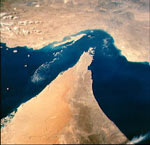 Reuters: The chief of the U.S. Navy acknowledged on Tuesday that preparing for a potential conflict in the Strait of Hormuz is the kind of thing he loses sleep over.
Reuters: The chief of the U.S. Navy acknowledged on Tuesday that preparing for a potential conflict in the Strait of Hormuz is the kind of thing he loses sleep over.
By Phil Stewart
 WASHINGTON Jan 10 (Reuters) – The chief of the U.S. Navy acknowledged on Tuesday that preparing for a potential conflict in the Strait of Hormuz is the kind of thing he loses sleep over.
WASHINGTON Jan 10 (Reuters) – The chief of the U.S. Navy acknowledged on Tuesday that preparing for a potential conflict in the Strait of Hormuz is the kind of thing he loses sleep over.
“If you ask me what keeps me awake at night, it’s the Strait of Hormuz and the business going on in the Arabian Gulf,” said Admiral Jonathan Greenert, who became the chief of naval operations in September.
The comments by Greenert follow threats by Iran last month to shut off the Strait of Hormuz — the world’s most important oil shipping lane — if new U.S. and EU sanctions over its nuclear program halted Iranian oil exports.
The United States has said it would not allow Iran to block the Strait, calling it a “red line” for the U.S. military. General Martin Dempsey, the top U.S. military officer, said over the weekend said that would be a “intolerable act.”
“Yes, they can block it … But we would take action and reopen the Straits,” Dempsey told a television talk show.
Greenert did not get into details about what steps the U.S. Navy would take to re-open the Strait. But when asked what about the Strait kept him awake at night, he responded: “I’m an organizer, a trainer and equipper. I’d make sure that our people have the right equipment to do the right thing.”
“Our folks that transit in and around that area, I want to make sure that they’re able to (deal) with the things that they need to deal with, basically self-protection, counter-swarm, ASW (anti-submarine warfare),” Greenert said.
Air Force Chief of Staff General Norton Schwartz told Reuters on Monday the Air Force would “clearly” play a role in potentially unblocking the Strait of Hormuz, if the United States took on that job.
He said the Air Force could ensure “either localized or broader air superiority,” providing support to other U.S. military assets and ensuring secure communications channels through satellites.
It would also play a key role in providing surveillance data from its satellites and aircraft. (Reporting By Phil Stewart; Editing by Cynthia Osterman)


